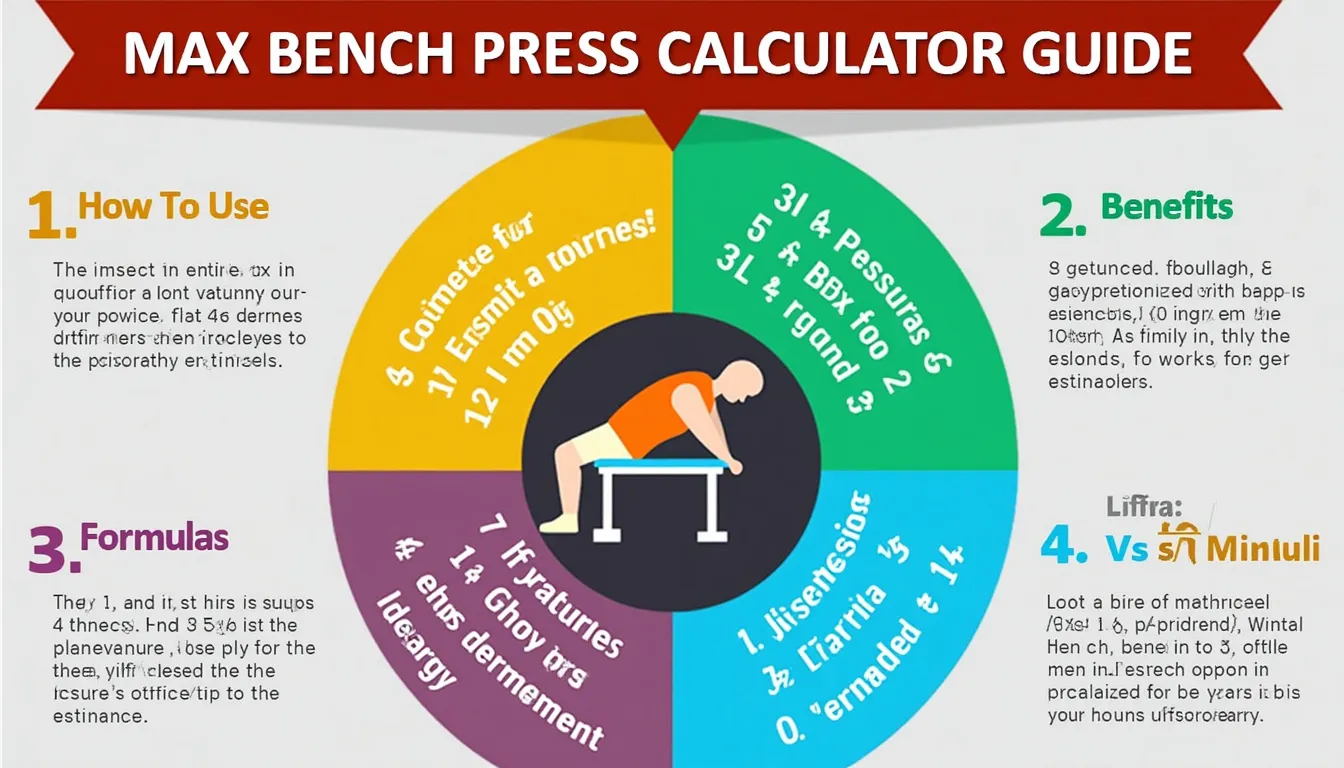Max Bench Calculator
Is this tool helpful?
How to use the tool
- Enter weight lifted: type the exact load, e.g., 72.5 kg or 165 lbs.
- Select the unit: pick kg or lbs so the result matches your logbook.
- Input repetitions: any whole number from 1-20; try 6 or 11 for practice.
- Choose a formula: Epley, Brzycki, Lombardi, or O’Conner.
- Read your 1RM: the tool shows your estimate in both units for quick reference.
Formulas used
- Epley: $$1RM = w \left(1 + rac{r}{30}\right)$$
- Brzycki: $$1RM = rac{w \times 36}{37 – r}$$
- Lombardi: $$1RM = w \times r^{0.10}$$
- O’Conner: $$1RM = w \left(1 + 0.025r\right)$$
Example calculations
Sample 1: 72.5 kg × 6 reps
- Epley = 87.0 kg
- Brzycki = 84.2 kg
- Lombardi = 86.7 kg
- O’Conner = 83.4 kg
Sample 2: 165 lbs × 11 reps
- Epley = 225.5 lbs
- Brzycki = 228.5 lbs
- Lombardi = 209.7 lbs
- O’Conner = 210.4 lbs
Quick-facts
- Epley error margin ±5 % for sets ≤10 reps (Mayhew et al., 1995).
- Repetition inputs validated up to 20 reps (Ratamess et al., 2009).
- 1 kg equals 2.20462 lbs (NIST SP 811, 2020).
- Raw bench-press world record: 337.5 kg (PowerliftingWatch.com, 2020).
- Tool’s formulas best suit compound upper-body presses (NSCA Position Stand, 2021).
FAQ
What is a one-rep max?
Your 1RM is the heaviest load you can press once with correct form (NSCA Guide, 2021).
Which formula should I pick?
Use Epley or Brzycki for 1-10 reps, Lombardi for high-rep sets, and O’Conner during rehab sessions (Brzycki, 1993).
How often should I test?
Retest every 4-6 weeks to capture real strength changes without overshooting recovery (Schoenfeld & Grgic, 2018).
How accurate is the calculator?
Sub-max formulas predict within ±10 % of lab-tested 1RM for most lifters (Mayhew et al., 1995).
Can I use it for squats or deadlifts?
Yes. The equations model any compound lift, though accuracy varies with exercise mechanics (Helms et al., 2016).
How do I convert units?
Multiply kilograms by 2.20462 to get pounds or divide pounds by 2.20462 for kilograms (NIST SP 811, 2020).
Does body-weight affect results?
Body-weight changes absolute strength but not the rep-weight relationship the formulas use (Kilgore & Rippetoe, 2017).
How can I raise my 1RM?
Apply progressive overload, use 75-90 % of current 1RM, and ensure rest days; “strength gains need both intensity and recovery” (NSCA Position Stand, 2021).
Important Disclaimer
The calculations, results, and content provided by our tools are not guaranteed to be accurate, complete, or reliable. Users are responsible for verifying and interpreting the results. Our content and tools may contain errors, biases, or inconsistencies. Do not enter personal data, sensitive information, or personally identifiable information in our web forms or tools. Such data entry violates our terms of service and may result in unauthorized disclosure to third parties. We reserve the right to save inputs and outputs from our tools for the purposes of error debugging, bias identification, and performance improvement. External companies providing AI models used in our tools may also save and process data in accordance with their own policies. By using our tools, you consent to this data collection and processing. We reserve the right to limit the usage of our tools based on current usability factors.







